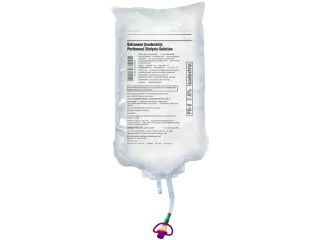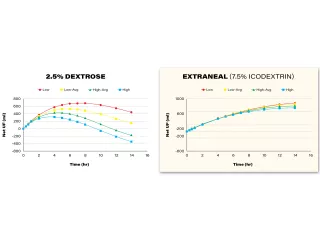
Extraneal (Icodextrin) PD Solution
Indications and usage
Extraneal (icodextrin) is indicated for a single daily exchange for the long (8- to 16- hour) dwell during continuous ambulatory peritoneal dialysis (CAPD) or automated peritoneal dialysis (APD) for the management of end-stage renal disease. Extraneal is also indicated to improve (compared to 4.25 % dextrose) long-dwell ultrafiltration and clearance of creatinine and urea nitrogen in patients with high average or greater transport characteristics, as defined using the peritoneal equilibration test (PET).
Less glucose from the start
Prescribing PD patients with icodextrin solution, such as Extraneal (7.5% icodextrin) solution for peritoneal dialysis from the start, limits glucose exposure during PD therapy.1,4,6-10
Fewer treatment complications
Icodextrin solution, such as Extraneal (7.5% icodextrin) solution for peritoneal dialysis, may improve clinical outcomes by increasing ultrafiltration and maintaining fluid balance.4,11-19
Less potential risk for PD dropout
When prescribed from the onset of PD, one daily bag of icodextrin solution, such as Extraneal (7.5% icodextrin) solution for peritoneal dialysis for the long dwell, may increase patient time on therapy.1,19,20
What is Extraneal?
Extraneal solution is a non-glucose, 7.5% icodextrin solution for the long dwell, widely used by nephrologists for 20+ years.
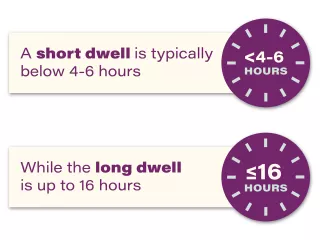
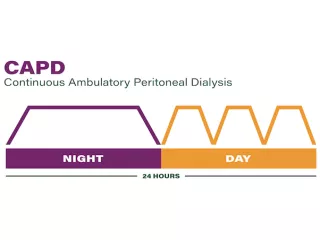
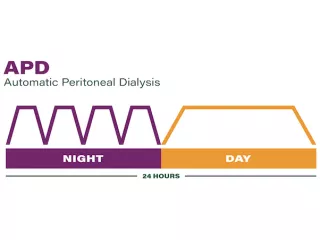
The long dwell
The dwell time is the prescribed period of time the dialysis fluid stays in the patient’s abdomen.
Continuous ambulatory peritoneal dialysis
Extraneal is indicated for a single daily exchange for the long dwell during continuous ambulatory peritoneal dialysis (CAPD). Exchanges are performed manually, and the long dwell is usually during the night.
Automatic peritoneal dialysis
During automated peritoneal dialysis (APD), a cycler assists the patient by automating the exchanges, and the long dwell usually occurs during the day.
Did you know that ISPD has updated recommendations on the use of icodextrin?
The International Society for Peritoneal Dialysis (ISPD) guidelines recommend “high-quality goal-directed peritoneal dialysis.”21
Individualisation of the prescription is a key component of this high- quality dialysis therapy, and this can be achieved through a combination of icodextrin and glucose-based solutions.21
This is contrary to the prevalent notion that only glucose solutions should be used at the beginning of PD therapy.
Vantive and Extraneal are trademarks of Vantive Health LLC or its affiliates.
References
-
Takatori Y, Akagi S, Sugiyama H, et al. Icodextrin increases technique survival rate in peritoneal dialysis patients with diabetic nephropathy by improving body fluid management: a randomized controlled trial. Clin J Am Soc Nephrol. 2011;6(6):1337-1344.
-
Woodrow G, Fan SL, Reid C, Denning J, Pyrah AN. Renal Association Clinical Practice Guideline on peritoneal dialysis in adults and children. BMC Nephrol. 2017;18(1):333.
-
Morelle J, Sow A, Fustin CA, et al. Mechanisms of crystalloid versus colloid osmosis across the peritoneal membrane. J Am Soc Nephrol. 2018;29(7):1875-1886.
-
Paniagua R, Ventura MD, Avila-Díaz M, et al. Icodextrin improves metabolic and fluid management in high and high-average transport diabetic patients. Perit Dial Int. 2009;29(4):422-432.
-
Mujais S, Vonesh E. Profiling of peritoneal ultrafiltration. Kidney Int Suppl. 2002;(81):S17-S22.
-
Davies SJ, Brown EA, Frandsen NE, et al. Longitudinal membrane function in functionally anuric patients treated with APD: data from EAPOS on the effects of glucose and icodextrin prescription. Kidney Int. 2005;67(4):1609-1615.
-
Wang IK, Lin CL, Chen HC, et al. Risk of new-onset diabetes in end-stage renal disease patients undergoing dialysis: analysis from registry data of Taiwan. Nephrol Dial Transplant. 2018;33(4):670-675.
-
Furuya R, Odamaki M, Kumagai H, Hishida A. Beneficial effects of icodextrin on plasma level of adipocytokines in peritoneal dialysis patients. Nephrol Dial Transplant. 2006;21(2):494-498.
-
de Moraes TP, Andreoli MC, Canziani ME, et al. Icodextrin reduces insulin resistance in non-diabetic patients undergoing automated peritoneal dialysis: results of a randomized controlled trial (STARCH). Nephrol Dial Transplant. 2015;30(11):1905-1911.
-
Gürsu EM, et al. The effect of icodextrin and glucose-containing solutions on insulin resistance in CAPD patients. Clin Nephrol. 2006;66(4):263-268.
-
Goossen K, Becker M, Marshall MR, et al. Icodextrin versus glucose solutions for the once-daily long dwell in peritoneal dialysis: an enriched systematic review and meta-analysis of randomized controlled trials. Am J Kidney Dis. 2020;75(6):830-846.
-
Davies SJ, Woodrow G, Donovan K, et al. Icodextrin improves the fluid status of peritoneal dialysis patients: results of a double-blind randomized controlled trial. J Am Soc Nephrol. 2003;14(9):2338-2344.
-
Konings CJ, Kooman JP, Schonck M, et al. Effect of icodextrin on volume status, blood pressure and echocardiographic parameters: a randomized study. Kidney Int. 2003;63(4):1556-1563.
-
Cho Y, Johnson DW, Badve S, Craig JC, Strippoli GF, Wiggins KJ. Impact of icodextrin on clinical outcomes in peritoneal dialysis: a systematic review of randomized controlled trials. Nephrol Dial Transplant. 2013;28(7):1899-1907.
-
Chow KM, Szeto CC, Kwan BC, et al. Randomized controlled study of icodextrin on the treatment of peritoneal dialysis patients during acute peritonitis. Nephrol Dial Transplant. 2014;29(7):1438-1443.
-
Kim YL, Biesen WV. Fluid overload in peritoneal dialysis patients. Semin Nephrol. 2017;37(1):43-53.
-
Ho-dac-Pannekeet MM, Schouten N, Langendijk MJ, et al. Peritoneal transport characteristics with glucose polymer based dialysate. Kidney Int. 1996;50(3):979-986.
-
Morelle J, Stachowska-Pietka J, Öberg C, et al. ISPD recommendations for the evaluation of peritoneal membrane dysfunction in adults: classification, measurement, interpretation and rationale for intervention. Perit Dial Int. 2021;41(4):352-372.
-
Woodrow G, Fan SL, Reid C, Denning J, Pyrah AN. Renal Association Clinical Practice Guideline on peritoneal dialysis in adults and children. BMC Nephrol. 2017;18(1):333.
-
Johnson DW, Vincent K, Blizzard S, Rumpsfeld M, Just P. Cost savings from peritoneal dialysis therapy time extension using icodextrin. Adv Perit Dial. 2003;19:81-85.
-
Brown EA, Blake PG, Boudville N, et al. International Society for Peritoneal Dialysis practice recommendations: prescribing high-quality goal-directed peritoneal dialysis. Perit Dial Int. 2020;40(3):244-253.
